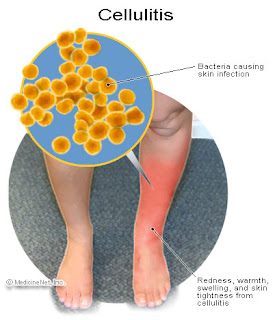

this is second type of infection caused by MRSA.
A boli is also reffered as skin abscess,is a localized infection deep in the skin.A boil generally starts as a reddened,tender area.Over time the area becomes firm and hard.Eventually the center of the abscess softens and becomes filled with infection -fighting white blood cell that the body sends from the bloodstream to eradicate the infection.This collections of white blooad cells,bacteria and protein is known as pus.Fnally the pus "forms a head" which can be surgically opened or spontaneously drain out through the surface of the skin.
There are seven different types of boils,but the main are listed below.....
1. FURUNCLE or CARBUNCLE : This is the abbscess of skin caused by bacterium staphylococcus aureus.A furuncle may have one or more opening onto the skin and may be associated with a fever or chills.
2. CYSTIC ACNE : This is a type of abscess that is formed when oil ducts become clogged and infected.cystic acne affects deeper skin tissue that the more superficial inflammation from common acne.cystic acne is most common on the face and typically occurs in teenage age.
3. HERADENITIS SUPPURATIVA : This is a condition in which there are multiple abscess that formed under the armpits and often in the groin region. These area are a result of local inflammation of the sweet glands.This form of skin infection is difficult to treat with antibiotics alone and typically requires a surgical procedure to remove the involved sweat gland in order to stop the skin inflammation
4. PILONIDAL CYST : This is a special kind of abscess that occurs in the crease of buttocks.Pilonidal cyst often begins as a tiny area of infections in the base of the area of skin from which the hair grows(the hair follicle).with irritation from direct pressure,overtime the inflammed area enlarges to become a firm,painful,tender nodule making it difficult to sit without discomfort.These frequently forms after long trip that involved prolonged sitting
WHY DO BOILS OCCURS??
There are many causes of bolis.Some boils can be caused by an ungrown hair,other can forms as a result of a spinter or other foreign material that has become logged in the skin.some boils auch as acne are caused by plugged sweat gland that become infected.
The skin is an important part of our immune defense against material and microbes that are foreign to our body.Any break in the skin,a cut or a scrap can develop into an abscess.
WHO IS LIKELY TO DEVELOP A BOIL??
Anyone can develop a boli but people with diabetis or kidney failure and hypogammaglobulinemia are more prone to this as their immune system has become too weak to resist it.
TREATMENT OF BOIL :
The primary treatment for boil is heat application usually with hot soaks or hot packs.Heat application increases the circulation to the area and allows the body to bette fight of the infections by bringing antibodies and white blood cells to the site of infection.
As long as boil is firm and small,opening the area and draining the boil is not helpful,even if area is painful,however once the boil becomes soft"forms head"(i.e. a small pustule is noted in the boil it is ready to drain and after draining pain is relifed.
Many medication can suppress the normal immune system and increase the risk of developing boils,these medications include cortisone medication(prednisone and prednisolone) and medication used for cancer chemotherapy so we should remain extra careful if we are taking these kinds of medications.
Sometimes antibiotics can also be used to elimintate the accompanying bacterial infection.Especially if there is an infection of surrounding skin,doctors generally prescribes antibiotics but still additional surgical operations is needed to cure this.

